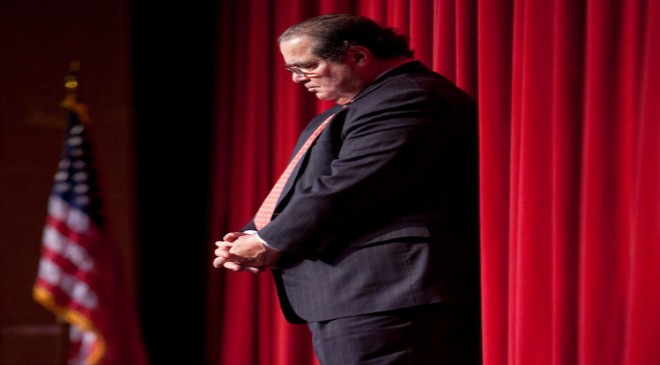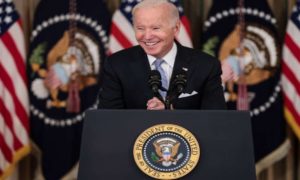WASHINGTON – Back in the spring of 1982, a group of three conservative students put on a conference at Yale University with a simple mission: They wanted to offer a counterweight to what they saw as a saturation of liberal thinking at the nation’s leading law schools.
Their timing was fortunate: Less than two years after Ronald Reagan ascended to the presidency, conservativism was having a national moment, and the students’ effort to capitalize on that political success to fuel a movement in legal circles spread from campus to campus.
“As a conservative, you kind of felt like you were on an island,” said David McIntosh, a former Republican congressman from Indiana and one of the co-founders of what became the Federalist Society. “One of the things that happened was when we put up a little bulletin and said, ‘Hey, we’re forming a conservative law student group, come have pizza with us,’ 10 people would show up who didn’t really know each other – didn’t know there were other conservatives – and became friends.”
Four decades later, the Supreme Court wrapped up a historic term that turned out to be a triumph for the conservative legal movement, including the Federalist Society. The nation’s highest court ended the constitutional right to abortion it established in 1973 in Roe v. Wade, made it easier for Americans to carry guns and redrew the boundary separating church and state.
The rulings, though divisive and criticized on the left, followed a decadeslong push by the Federalist Society, which is today a powerful network of nearly 70,000 attorneys, to promote originalism, the idea of interpreting the Constitution as the framers would have understood it. The decisions were the result of a strategic effort by Republican presidential administrations to vet and promote judges with conservative ideologies.
Democrats have balked for years at what they view as the Federalist Society’s undue influence on a court that’s supposed to be above partisan politics. Sen. Sheldon Whitehouse, D-R.I., sought to tie the group to others that air television ads supporting or opposing Supreme Court nominees. He pointed to the role the Federalist Society played in helping President Donald Trump select justices for the high court.
“The right-wing goal has been to control the court, to achieve policy gains against the will of the American public,” Whitehouse said in a statement after the court overturned Roe v. Wade. “This decision is exactly the kind of deliverable they had in mind when they packed the court with Federalist-Society-chosen justices.”
Conservatives had grown disillusioned with GOP-nominated associate justices on the court such as John Paul Stevens, Sandra Day O’Connor, David Souter and Anthony Kennedy who turned out to be more swing votes than stalwart conservatives. Many have expressed similar misgivings about Chief Justice John Roberts, who broke from his fellow conservative justices in the abortion decision June 24 by declining to support their decision to overturn Roe.
When Trump vowed in the 2016 election to name justices to the Supreme Court who would overturn the landmark Roe decision, it made sense that he turned to Leonard Leo, the Federalist Society’s co-chairman, to help build a list of candidates. Trump used that list to court evangelical voters and wound up nominating three justices: Neil Gorsuch, Brett Kavanaugh and Amy Coney Barrett.
All three, along with Associate Justices Clarence Thomas, who was nominated by President George H.W. Bush, and Samuel Alito, one of President George W. Bush’s nominees, voted to overturn Roe.
Leo declined a request for an interview.

Edwin Meese, Reagan’s second attorney general, said the purpose of the Federalist Society was never to overturn Roe v. Wade or to help presidents select jurists.
“The Federalist Society was aimed at getting us back to the Constitution,” Meese said, “and the actual use of the Constitution for deciding cases as opposed to the way in which it had drifted under a number of courts and chief justices since about the 1950s.”
It was about promoting a legal philosophy – originalism – that Alito, Thomas, Gorsuch, Kavanaugh and Barrett ruled was inconsistent with Roe. One of the keynote speakers at the Yale conference in 1982 was Robert Bork, then a judge on the powerful U.S. Court of Appeals for the District of Columbia Circuit, who years earlier had written a seminal law review article elevating originalism.
Bork, according to a New York Times story, criticized the Supreme Court at the conference for an effort to ”nationalize morality.” Bork told the conference that some issues were better left to the states, including abortion – an argument that Alito stressed throughout the court’s blockbuster opinion.
“The Constitution does not prohibit the citizens of each state from regulating or prohibiting abortion,” Alito wrote, and the court would “return that authority to the people and their elected representatives.”
Reagan nominated Bork to the Supreme Court in 1987, but in a high-stakes fight conservatives still blame for politicizing the confirmation process, he was rejected by Senate Democrats. Another attendee of the Yale conference, Antonin Scalia, fared better. The former University of Chicago law professor was confirmed to the Supreme Court unanimously in 1986 and became its most outspoken originalist.
In his opinion upholding Mississippi’s ban on most abortions after 15 weeks of pregnancy, Alito relied heavily on originalism. Alito called attention to the fact that the word “abortion” doesn’t appear in the Constitution. He asserted the nation didn’t understand abortion to be a protected right when the 14th Amendment was adopted in 1868, noting that three-quarters of states had made the procedure a crime at any stage of pregnancy.
Thomas made a similar historical assessment a day earlier in a decision last month invalidating a New York law that required residents to have a special reason to obtain a license to carry a handgun. Writing for a 6-3 majority, Thomas said judges shouldn’t consider what a government says is the benefit of a gun law and instead focus on the text of the Constitution and whether there are antecedents for the challenged gun law.
Of course, history itself is often debatable – and even conservatives on the Supreme Court don’t always agree on what result an original approach should yield. Sometimes, it’s not clear what the Founding Fathers had in mind. Often there was a diversity of opinion at the nation’s founding. That’s part of the reason why the liberal justices on the Supreme Court reject originalism.
“The framers … understood that the world changes,” the court’s liberals wrote in dissent in the Mississippi abortion case. “So they did not define rights by reference to the specific practices existing at the time. Instead, the framers defined rights in general terms, to permit future evolution in their scope and meaning.”

Amanda Hollis-Brusky, a political scientist at Pomona College, said the Federalist Society and the conservative legal movement are best understood in the context of which party held the White House. It was the Reagan administration where many of the group’s early members, including some who sit on the Supreme Court today, started their careers. By the time President George W. Bush came to power in 2000, originalism had “grown up,” she said, and could be deployed.
“It wasn’t long before the (Federalist Society) founders were connected with conservative elites and folks working in the Reagan administration,” said Hollis-Brusky, author of “Ideas With Consequences: The Federalist Society and the Conservative Counterrevolution.” The group’s founders, she said, learned “that in order for their ideas to have consequences, they really needed to gain access to the levers of power.”

























